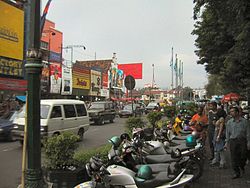| Dongeng Kancil untuk Kemerdekaan | |
|---|---|
 The film follows four children on Malioboro Street | |
| Directed by | Garin Nugroho |
| Starring | Children: Kancil, Topo, Sugeng and Hatta |
Release date |
|
Running time | 55 minutes |
| Country | Indonesia |
| Language | Indonesian |
Kancil's Tale of Freedom (Indonesian: Dongeng Kancil untuk Kemerdekaan) is a 1995 Indonesian documentary film directed by Garin Nugroho.